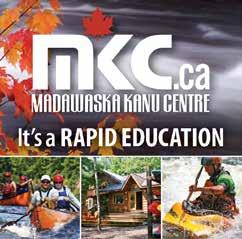
4 minute read
Survival Quiz
SURVIVAL QUIZ
If you get lost, these ideas can help you live to hike another day
Advertisement
BY ALLEN MACARTNEY
Sooner or later, if you’re into the woods often enough, you get lost. For paddlers, backpackers, off-road cyclists or just day hikers, it’s almost inevitable.
This quiz highlights some survival fundamentals. We hope it educates and entertains, and we know any increase in survival awareness reinforces confidence, comfort and enjoyment outdoors. Check off your answers, and look to the end of the quiz to find how well you did, and for brief explanations.
1.
2.
3.
4. In late summer or early fall woods, what’s the biggest threat?
a) Wolf attack b) Bear attack c) Moose attack d) Coyote attack
Put this list of survival concerns in the right
order – most important first, least important last: looking after injuries, finding food, finding water, building a shelter, getting a fire going.
A good way to get something to drink is:
a) Kill a bird or animal and drink the blood b) Make a divining rod from a green forked branch, and walk until it points down c) Walk downhill looking for water d) Soak up dew from grass and plants with a
T-shirt in the morning
A shelter from the cold should be:
a) So small that you can barely fit in b) Located at the bottom of a valley or hill c) Built only from dead material so you don’t damage living plants d) In a field to absorb solar radiation for warmth.
5.
6.
7.
8. You’re lost in dense forest far from home. What can kill you fastest?
a) hunger b) panic c) wild animals d) thirst
A small survival pack should contain at least:
a) large plastic bag, matches, fire-starter, whistle, knife b) trail mix, knife, fishing line, hooks, matches c) small hatchet, knife, energy bar, cord, whistle d) knife, matches, energy bar, plastic bag,
Band-Aids
If you’re lost, the first thing to do is:
a) Walk a little faster to try to find the trail b) Sit down and have a snack c) Build a fire and start collecting wood d) Look for game trails to follow
The main purpose of a shelter is to:
a) Protect from wild animals b) Protect from wind, rain or snow c) Protect from heat and sunstroke d) Provide comfort
9. If you’re lost and darkness is falling and it’s starting to rain, you should:
a) Build a shelter and prepare to spend the night b) Stop, gather firewood and build a shelter. c) Press on because you’re close to your car d) Eat your last energy bar, look at the map, then press on
10. Your canoe capsizes in a lake in July on a windy, cloudy afternoon. Your lifejacket is on and you’re close to shore. Your greatest danger is:
e) hypothermia f) wild animals g) sunstroke h) drowning 12. Food is a top priority when you get lost.
T____ F____
13. Any injury multiplies your danger when lost. T____ F____
14. When lost, water is usually a greater priority than shelter. T____ F____
15. A positive attitude is a better asset than
matches and an energy bar. T____ F____
16.

ANSWERS

800-461-7238 owlrafting.com

in rut is dangerous. Wolves, coyotes and bears have eaten well all summer and will usually ignore you.
1c In August and September a bull moose
3c/d Walking downhill (the way water flows) often leads to water. Dew is a source too.
2 After injuries, the priority is shelter, fol lowed by water, fire and food.
as a blanket to keep you warm and dry.
4a A shelter needs to be small. Think of it
When lost it’s very important to purify water to drink. T____ F____
5b Panic can kill because it short-circuits rational thinking. Scared hikers are known to start running through the forest, often past trail markers; they get injured and exhausted, which acceler ates fear and panic.
6a The large plastic bag can provide shelter and warmth; matches and starter mean fire and heat. A knife can cut branches for shelter and fire; a whistle can bring help. A cloth can soak up water. 7b
8b
9a/b
10a
11.
12.
13. 14.
15.
16. Calming down is vital when the realization sinks in that you’re lost. Stopping for a snack gives you time to think. Ideally a shelter will keep you dry and relatively warm. If you get lost even in daylight, pressing on in the dark won’t work either. Hypothermia can occur even in summer, especially in wind. False. Salty water will only dehydrate you further – potentially very dangerous. False. People can live at least two or three weeks without food, but only a few days without water. True. False. Usually, shelter is a more important in Canada than water. True. A positive attitude encourages clear thinking, flexibility and brainstorming. False. Most lost people are rescued long before tainted water can make them sick.
STUART LOG COTTAGE Rent a traditional log cabin in the Ottawa Valley (613) 628-3311 FOR MORE INFO CALL • 4 piece bath w/ tub+shower • full kitchen w/ fridge+stove • spacious living room w/ large stone fireplace • great for family or romantic getaway • loft bedroom suitable for family • private dock on Mink Lake
facebook.com/StuartLogCottage www.stuartlogcottage.com











